Israeli Airstrike Kills Senior Hezbollah Commander

The Israeli military has confirmed that a senior Hezbollah commander, Ismail Yousef Baz, has been killed in an airstrike.

The Israeli military has confirmed that a senior Hezbollah commander, Ismail Yousef Baz, has been killed in an airstrike.
According to the IDF, Baz was active in planning and carrying out both rocket and antitank missile attacks against Israel from the Lebanese coastal area.
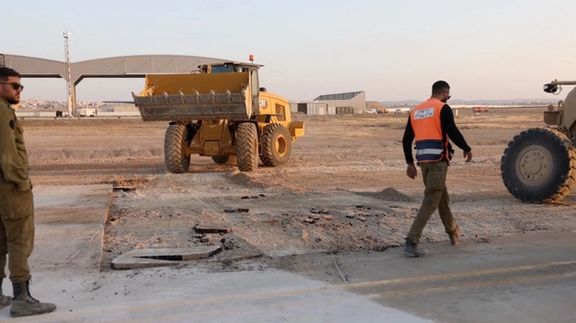
Iran International was authorized to film and report from the Nevatim Air Base in Israel after the Iranian military claimed that the base had been severely damaged during the failed weekend drone and missile attack.
Contradicting remarks by the Islamic Republic's armed forces chief, who claimed that the attack had achieved all of its objectives, IDF spokesperson Rear Adm Hagari who accompanied Iran International's reporter to the airbase stated that the facilities had sustained minimal damage. Video footage shows that there was minor damage to non-critical areas in the base, while F-35 warplanes were seen taking off.
Hagari explained that the only place that has suffered some damage to its infrastructure during Iran’s attack is this airbase which is “fully in operation”.
“The Islamic Republic is lying. All the money that Iran spent on this attack resulted only in this pit”, The IDF spokesman said, showing a cavity in the ground next to an unfinished concrete structure.
Iran launched hundreds of ballistic and cruise missiles as well as drones at Israel on Saturday. However, the Israeli Defense Forces confirmed that some 99% of the incoming projectiles were downed, and those that survived caused only minor damage.
As reported by the IDF, the Israeli Air Force successfully intercepted and destroyed 170 drones and 30 cruise missiles outside the country's borders.
Another factor contributing to the limited impact was that US, UK, French, and Jordanian jets flying over the region and downing Iranian drones and cruise missiles.
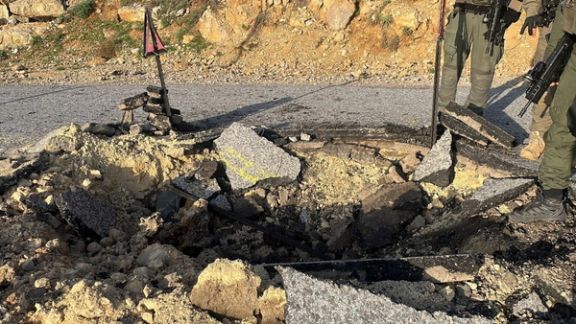
In addition, Arab nations such as Saudi Arabia and the United Arab Emirates provided intelligence assistance to the defensive operation, as reported by the Wall Street Journal.
As this is the first time Iran has attacked Israel from its soil, the threat of a wider conflict in the region has been raised.
Until now, Israel has stated that the Iranian attack on its soil "will be met with a response", but has not provided further details. The Israeli war cabinet has made three times to decide about a potential response. Israel's Western allies have urged restraint, concerned about a further escalation in the region.
Israel Army Chief of Staff Gen. Halevi stated in a video statement that Iran will face the consequences of its actions. “We will choose our response accordingly."

The Iranian Chief of Staff of the Armed Forces, Major General Mohammad Bagheri, called the recent attack on Israel a "historical and proud operation."
He said that the aerial bombardment represents a new level of military capabilities and a new defense policy of Iran against the world, not acknowledging the fact that 99 percent of the 350 plus drones and missiles were intercepted by Israel and its allies.
An Israeli Defense Forces (IDF) spokesperson said all of the 170 drones and 30 cruise missiles were destroyed before reaching the borders of Israel, and most of the 120 ballistic missiles were intercepted with the help of Israel's long-range Arrow air defense system.
Meanwhile, the firebrand Tehran Friday Prayer Leader, Ahmad Khatami, said on Tuesday that: "After the IRGC attacked Israel, they scared the people, saying Israel will do this and that to them. But they couldn’t do anything. Even in the Security Council, they were unable to pass a resolution."
The United Nations Security Council held a special session in New York on Sunday over the attack but refrained from condemning Iran's activities.
US Ambassador Robert Wood called on the council to speak out against "aggressive actions" from Iran, while asking for an end to attacks by the Islamic Republic, its partners, and proxies. No resolution was offered, and the session ended without an agreed-upon formal statement or vote.
The bombardment was a retaliation for the April 1 alleged Israeli air strike on the Iranian consulate in Damascus which killed two senior Quds Force commanders and several IRGC personnel. Iran said the attack on Israel was a legitimate means of self defence following the Syria strike. Israel has not taken credit for the operation.
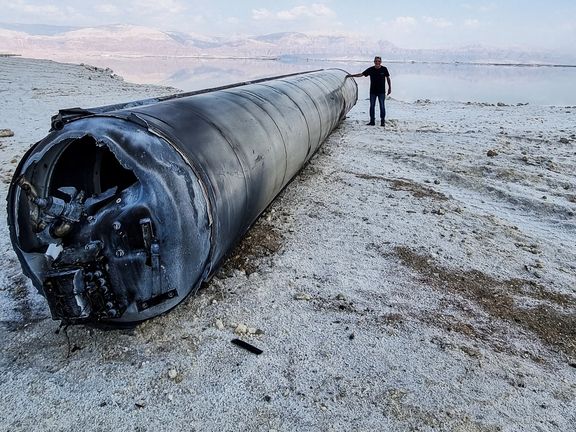
Wreckage from Iranian missiles and drones destined for Israel has been discovered across Iraq following Saturday night’s foiled bombardment.
Over the weekend, US-led coalition forces in Iraq successfully intercepted dozens of the projectiles, a source close to the Iraqi government told The National.
The majority of the Iranian drones and missiles were shot down above key areas including Baghdad, Najaf, and the semi-autonomous Kurdish region in northern Iraq.
US anti-missile systems stationed at the Ain Al Asad airbase in Anbar province were pivotal in neutralizing the airborne threats. Additionally, a US Patriot battery in the Kurdish region intercepted at least one ballistic missile, which subsequently crashed in the Soran district near Erbil.
Following the attack, which involved more than 300 drones and missiles launched by Iran towards Israeli territory, the Iraqi landscape was littered with remnants of the intercepted weapons. Notably, parts of a drone were found in an open area outside Najaf. No casualties have been reported from the incident, another official said.
Along with the US, Israel was aided by the UK, Jordan and France in the mission to intercept the barrage.
The Iranian offensive came in retaliation to an Israeli airstrike on April 1 on Tehran's consulate building in Damascus, which resulted in the death of two high-ranking Iranian military officials plus other IRGC personnel.
Despite the chaotic aftermath, the Iraqi government has yet to issue a formal denunciation of Iran’s use of its airspace for the attacks.
A spokesman for the Iran-backed Al Nujaba militia in Iraq criticised Baghdad after the attack, saying the intervention of US forces "undoubtedly embarrasses the Iraqi government, which seeks to take a clear position on the American military presence" in the country.
The US Central Command said it “successfully engaged and destroyed” more than 80 one-way attack drones and at least six ballistic missiles intended to strike Israel from Iran and Yemen. It was the first direct attack from Iranian soil to target the Jewish state after years of shadow warfare.
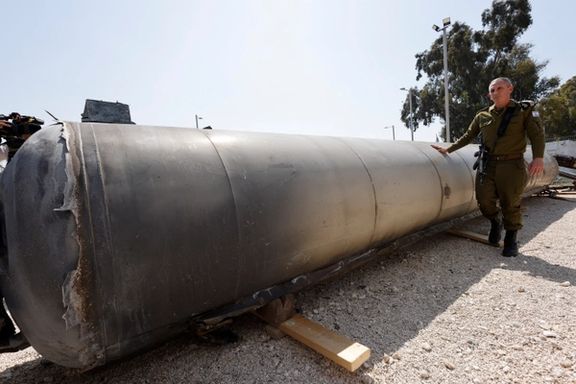
Iranian government and military officials are doubling-down on their narrative that Sunday’s attack on Israel was a great success.
The Islamic Revolutionary Guards (IRGC) launched 170 drones, more than 30 cruise missiles and more than 120 ballistic missiles – 99% of which were intercepted by Israel and its allies.
In the days since the unprecedented attack, several politicians have spoken out in support of the military action against Tel Aviv.
That included Esmail Kosari, a parliamentarian who sits on the National Security Committee, who justified the operation and framed it as a "legitimate defense against Israel”.
“The news, information, and documentation of the amount of damage we caused to Israel will be made known to the people so that the people of Iran will be informed about the details of the relevant information," Kosari said.
Israel has reported that damages sustained by the attack were limited to minor damage of its air base in Nevatim.
Reports also suggest that a 7-year-old girl from a Bedouin community in Israel suffered a head injury, potentially due to shrapnel from an intercepted ballistic missile falling directly on her home.
Support for Tehran’s military operation also came from so-called reformist journalists, one of whom warned against “internal dissent” and echoed the IRGC’s narrative of the event, criticizing those who dispute the effectiveness of the operation.
“Unfortunately, some inside the country have become defenders of the devil…they promote and reproduce 99 percent of the Israeli narrative,” Mashallah Shamsolvaezin said.
Threats Of Harsher Retaliation
The rhetoric from Iranian officials also included warnings directed at Israel and the United States.
The government’s parliamentary speaker, Mohammad Bagher Ghalibaf, warned Israel of "harsher responses".
Meanwhile, the Army’s Commander-in-Chief Abdolrahim Mousavi, threatened heavier retaliation “if Israel persists in its actions”.
Mousavi also threatened Washington to steer clear from using its bases in any retaliation, saying that "they will be considered operational targets and will be targeted".
The Supreme Leader Ali Khamenei's representative in the northwestern province of Khorasan, reinforced these warnings by invoking the possibility of devastating retaliatory measures.
Other Iranian figures such as Sadegh Amoli Larijani, Chairman of the Islamic Republic’s Expediency Council, and Iraj Masjidi, a senior adviser to the commander of the IRGC, insisted on the “failure of Israeli defenses” to deter Iranian missiles, boasting Iran's confidence in its military capabilities.
Parliamentarian Jalil Rahimi Jahanabadi, another member of the National Security Committee, further claimed that "in order to achieve peace, one must stand against the tyrant and the aggressor."
Mahmoud Abbaszadeh Meshkini, another parliamentarian, dismissed Israel's capabilities in fighting against the Islamic Republic saying that Israel is not capable of doing anything against Iran’s national interests.
“They just pretended to fight back," he said.
"I think it is unlikely that Israel will hit our civilian sites, not even our military sites," said parliamentarian Abbas Golrou.
Golrou also expressed skepticism about an all-out war with Israel – suggesting that neither Iran nor the US desire that kind of conflict.
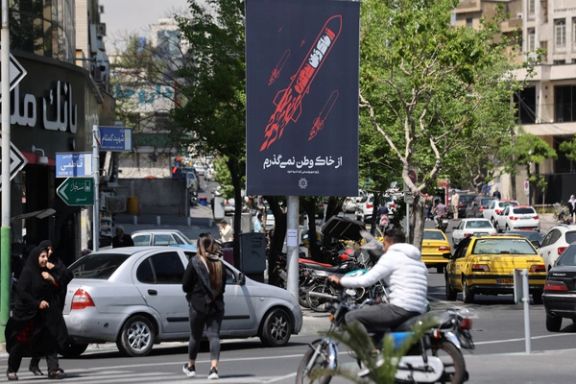
For the last 45 years, Iranians have resorted to using humor as a crutch in coping with the country’s various challenges – including the aftermath of the Islamic Revolution, ongoing economic struggles, and the nuclear crisis.
In Iranian society – where there is no freedom of speech, media, or assembly – humor and political jokes are often used as a vital form of resistance, to make sense of hardships and provide momentary relief to forget one’s daily struggles.
Of course, this phenomenon has a history in other totalitarian regimes, like the Soviet Union. During the Soviet period, political jokes served as a form of social protest, mocking and criticizing leaders, the system, its ideology, myths, and routines.
Iranian political satire dates back to the Constitutional Movement era. The critical works of Ali Akbar Dehkhoda and Ashrafuddin Gilani, along with critical magazines such as Tolou’-e Mosavvar, Adab, Kashkool, and Azerbaijan, constitute a significant heritage in contemporary Iranian literature. Political satire flourished in the works of writers such as Gholamhossein Saedi, Jalal Ale-Ahmad, Bahram Sadeghi, and Javad Mojabi in the 1960s and 1970s and Towfeeq Magazine in the 1920s to 1960s. Being acquainted with this tradition, Iranians from all walks of life know the effectiveness of this genre and take part in producing sarcasm, parody, and scorn.
Before social media and smartphones, Iranians used to crack political jokes in taxis, barber shops, public baths, and coffee shops to ridicule the Islamist regime’s policies and officials.
Now, with 60 million smartphones in their hands, Iranians are busy entertaining each other online. Immediately after the news of the IRGC missile and drone attacks on Israel, jokes were circulated all over the country: the number of jokes were limitless.
The jokes mocked the Iranian military action so effectively that it prompted the state-owned TV stations to try to retaliate – though their jokes came across as flat and unassuming. The IRGC’s Intelligence Unit and the judiciary also made threats to prosecute anyone who ridiculed and criticized the military establishment.
Here is a sample of these jokes in Persian and English. Iranians began making fun of what happened in the early hours of April 13th, 2024 – with nothing beyond their colorful imaginations.
“By God (or frankly), if they had thrown cucumbers, the casualties would have been higher.”
A sarcastic remark about the ineffectiveness of the IRGC missiles used in the attack – suggesting that even something as harmless as cucumbers could have been more damaging.
“Addressed to the ruling clerics: ‘If you had thrown your diapers, at least Israel would have been busy cleaning up’."
The reference of diapers here, likely a sarcastic reference to the age of many of the Shiite clerics ruling Iran.
"If Iran would have donated free ‘Pride’ cars to Israel instead of these drones and missiles, it would have cost less and caused more damage."
A humorous critique suggesting that Iran’s domestic car brand, Pride, known for its poor quality – would have been more problematic for Israel than the attack. Thereby, making the donation of Pride cars, being both cheaper and more effective in causing a disruption for Israel.
"Erbil, Ilam, and Kermanshah were in the path of these flying water heaters. Why the properties in Shiraz and Mamasani?"
Calling the missiles and drones "flying water heaters", the joke pokes fun at the fact that the Iranian attack hit cities that were not on the flight path – like Shiraz and Mamasani.
"The missiles launched by the Islamic Republic towards Israel enjoyed the journey more. The destination wasn't important."
The joke suggests that the missiles were more concerned with their flight than actually reaching their intended target, emphasizing their ineffectiveness or the lack of impact they had upon arrival.
"The sound of this truck's exhaust you hear is actually the engine of a Revolutionary Guards' drone secretly flying from Iraq towards Israel, and it will arrive there in another seven hours. All this secrecy wasn't necessary, brave one."
The use of the word “brave one” in this joke references the fact that Israel was aware of Iran’s unfolding attack for hours – rendering any supposed “bravery” of the operation futile or even comical.
"They would have arrived sooner if they had taken Snapp."
"Snapp" refers to a popular ride-hailing app in Iran, similar to Uber. The joke suggests that if the Iranian forces had used a commercial ride-sharing service for drones, similar to calling a taxi, their mission wouldn’t have taken so long to execute.
The drones must have stopped somewhere to pray; otherwise, they shouldn't have taken this long."
Iranian society has undergone mass secularization in recent years. The sarcastic remark of stopping for prayer pokes fun at the Islamic Republic’s ideology – often a point of ridicule for many Iranians who don’t align with the regime’s Islamist point of view. Iranian bus companies make scheduled stops for passengers to pray during long trips.
“Now that the drone is stuck in the electric wire, hope its technology will not get in the hands of the enemy.”
Underlining the drone’s ineffectiveness, the remark sarcastically implying the minimal value or sophistication of the technology – should it fall into enemy hands.
“We created a fun Chaharshanbe Suri for them. Special thanks to the Sepah and the Iron Dome for creating this exciting night."
Chaharshanbe Suri is an Iranian festival celebrated on the last Wednesday before the Persian New Year (Norouz), involving fireworks and bonfires, symbolizing the warding off of evil spirits. The sentence sarcastically compares the attacks to the festival's fireworks, likely a reference to the fact that the Iron Dome intercepted 99% of the Iranian missiles/drones.
“The word ‘Pahpad’ is very chic. We should call the drones ‘Pahnemat’ instead.”
The word ‘pahpad’ in Persian means drone. The satirical term, ‘pahnemat’ is a way to suggest that the drones sent by the IRGC are as insignificant or useless as dog excrement.
“We have told everyone that we hit them. You should do the same. It makes no difference.”
The phrase, written in a thuggish tone, humorously suggests that despite the attack's failure, the authorities are insisting on claiming success and encouraging others to affirm this claim, regardless of the truth.
"- Did the missiles not arrive?
- No. They're still stuck in tunnel number 3.
- Or perhaps they've been demolished by the Darreshahr Iron Dome.”
In this case, the Darreshahr Iron Dome is an imaginary defense system – poking fun at the length of time it took for the Iranian attack to be carried out and drawing a parallel to the sophisticated Iron Dome in Israel.
"Addressing the drones: Go with your lights off; they won't hit you."
This joke suggests that turning off the lights on the drones may prevent them from being detected or targeted by Israel’s defense systems – with a sarcastic attitude towards the effectiveness of the drones.
“We are not from Kufa for Bibi to be left alone.”
This joke draws a parallel to a historical event in Islamic history where people from Kufa in Iraq, betrayed Ali (the first Shia Imam) resulting in his martyrdom. Typically, regime supporters use the phrase suggesting that they will not leave Ali alone. In this context, “Bibi” is Israeli Prime Minister Benjamin Netanyahu – and it's a sarcastic way of showing support for Israel – instead of the Iranian regime.
Baz, equated in rank to a brigade commander, had been a long-standing figure in Hezbollah's military operations. The IDF described him as a "senior and veteran official" within the terror organization, having held several pivotal roles.
Hezbollah launched two drones laden with explosives towards northern Israel to target an Iron Dome missile defense battery on Tuesday. The drones struck near the community of Beit Hillel, slightly injuring three people. Social media footage appeared to show one of the drones flying over the Galilee Panhandle.
In response, Israeli forces conducted a drone strike on a vehicle in Ain Baal near Tyre, approximately 15 kilometers from the Israeli border.
Hezbollah, known for its backing by Iran, along with other Palestinian groups like Hamas and Palestinian Islamic Jihad, has intensified its operations against Israel. The IDF reported that Baz was the sixth officer of his rank eliminated in recent operations, with over 30 Hezbollah commanders reportedly killed in the past six months.






